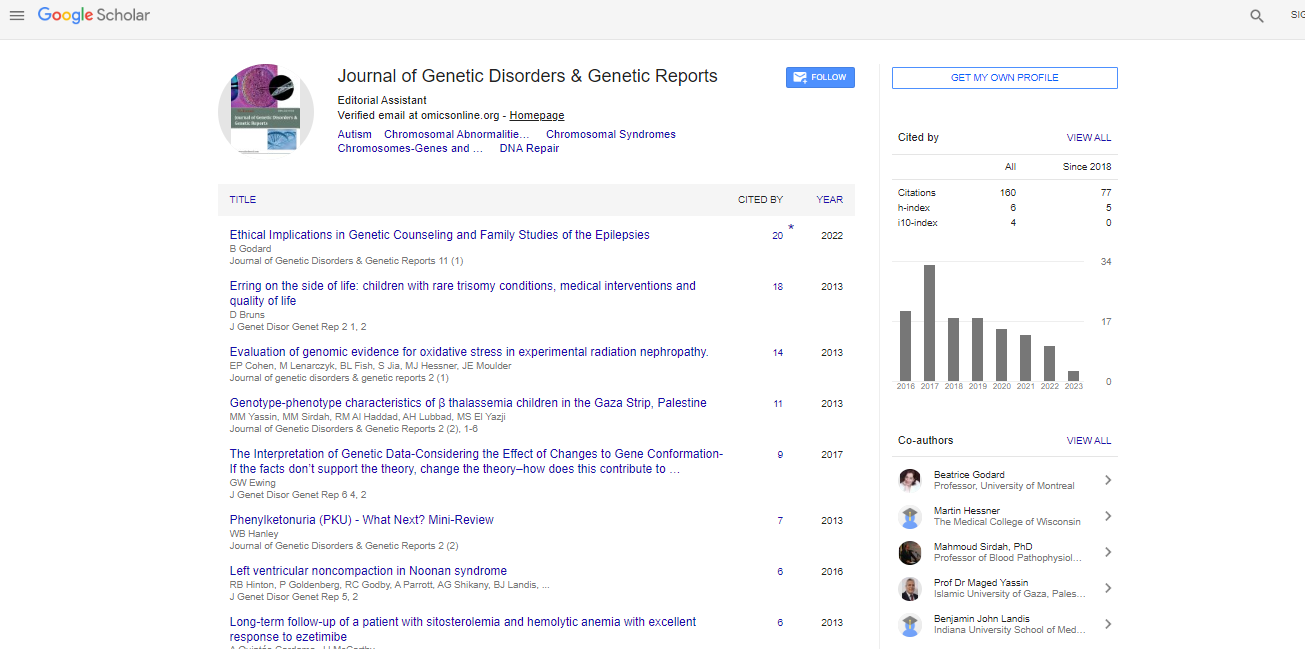Perspective, Vol: 12 Issue: 2
Genomic Insights: Advances in Genetic Diagnosis and Therapeutic Strategies
Shuang Kong*
1Department of Cardiology, Aalborg University, Aalborg, Denmark
*Corresponding Author: Shuang Kong
Department of Cardiology, Aalborg
University, Aalborg, Denmark
E-mail: Shuang Kong@rm.dk
Received date: 29 March, 2023, Manuscript No. JGDGR-23-99516;
Editor assigned date: 31 March, 2023, Pre QC No. JGDGR-23-99516 (PQ);
Reviewed date: 14 April, 2023, QC No. JGDGR-23-99516;
Revised date: 21 April, 2023, Manuscript No. JGDGR-23-99516 (R);
Published date: 28 April, 2023, DOI: 10. 4172/2576-1439.1000201
Citation: Kong S (2023) Genomic Insights: Advances in Genetic Diagnosis and Therapeutic Strategies. J Genet Disor Genet Rep 12:2.
Abstract
Genetic disorders encompass a wide range of conditions caused by abnormalities in an individual's genetic material. Over the years, significant advancements have been made in the field of genetic diagnosis and therapeutic strategies, leading to improved understanding, diagnosis, and treatment of genetic disorders. This paper aims to explore the recent advancements in genetic diagnosis and therapeutic strategies, highlighting their impact on patient care and outcomes.
Description
Genetic disorders encompass a wide range of conditions caused by abnormalities in an individual's genetic material. Over the years, significant advancements have been made in the field of genetic diagnosis and therapeutic strategies, leading to improved understanding, diagnosis, and treatment of genetic disorders. This paper aims to explore the recent advancements in genetic diagnosis and therapeutic strategies, highlighting their impact on patient care and outcomes.
Genetic diagnosis plays a crucial role in identifying the underlying genetic cause of a disorder, enabling targeted treatments and personalized care. Recent advancements in genetic diagnosis have revolutionized the field by providing more accurate, efficient, and comprehensive testing methods.
One notable advancement is the widespread adoption of Next- Generation Sequencing (NGS) technologies. NGS allows for the rapid and cost-effective sequencing of large portions of the genome, enabling the identification of disease-causing mutations. Whole Exome Sequencing (WES) and Whole Genome Sequencing (WGS) are particularly valuable in diagnosing rare and complex genetic disorders, as they provide a comprehensive analysis of protein-coding genes or the entire genome, respectively.
Furthermore, the integration of bioinformatics tools and databases has significantly enhanced the interpretation of genetic data. Algorithms and software platforms aid in the identification of pathogenic variants, annotation of their functional consequences, and correlation with disease phenotypes. Access to vast genetic databases, such as the Human Gene Mutation Database (HGMD) and Clin Var, facilitates variant classification and provides valuable insights into the pathogenicity of specific genetic alterations.
Once a genetic disorder is diagnosed, effective therapeutic strategies are crucial for managing symptoms, slowing disease progression, and improving the quality of life for affected individuals. Recent advancements in therapeutic approaches have expanded the options available for genetic disorders.
Gene therapy has emerged as a promising therapeutic strategy. It involves introducing genetic material into a patient's cells to correct or compensate for the underlying genetic defect. Recent breakthroughs in gene editing technologies, such as CRISPR-Cas9, have revolutionized the field of gene therapy by enabling precise and targeted modifications to the genome. Clinical trials utilizing gene therapy have shown promising results in treating various genetic disorders, including inherited retinal diseases and certain types of cancer.
Another significant advancement is the development of personalized medicine approaches for genetic disorders. By considering an individual's genetic profile, researchers can identify specific therapeutic targets and tailor treatment plans accordingly. Pharmacogenomics, for instance, examines how an individual's genetic variations affect their response to medications. This knowledge allows for the optimization of drug selection, dosage, and treatment regimens, maximizing therapeutic efficacy while minimizing adverse effects.
Furthermore, advancements in stem cell research and regenerative medicine offer potential therapeutic avenues for genetic disorders. Induced Pluripotent Stem Cells (iPSCs) can be generated from patientderived cells and differentiated into specific cell types affected by the disorder. These cells serve as valuable models for studying disease mechanisms, drug screening, and potentially as sources for cell replacement therapies.
The advancements in genetic diagnosis and therapeutic strategies have had a profound impact on patient care and outcomes. With improved diagnostic techniques, more accurate and timely diagnoses are possible, reducing the diagnostic odyssey often faced by individuals with genetic disorders. Early identification of genetic disorders allows for timely interventions and appropriate management strategies, resulting in better clinical outcomes.
Moreover, personalized therapeutic approaches have the potential to transform patient care. Tailoring treatments based on an individual's genetic profile ensures that interventions are more effective and less prone to adverse reactions. This targeted approach also minimizes unnecessary treatments, reducing healthcare costs and improving resource allocation. Advancements in genetic diagnosis and therapeutic strategies have also provided hope for previously untreatable or poorly managed genetic disorders.
 Spanish
Spanish  Chinese
Chinese  Russian
Russian  German
German  French
French  Japanese
Japanese  Portuguese
Portuguese  Hindi
Hindi 



